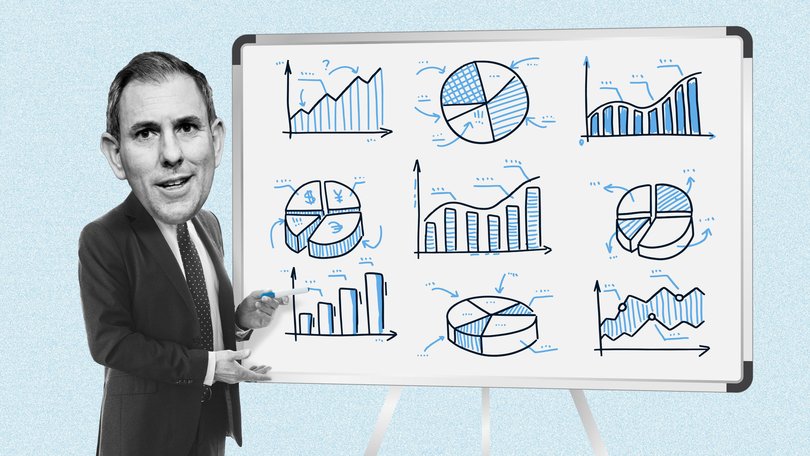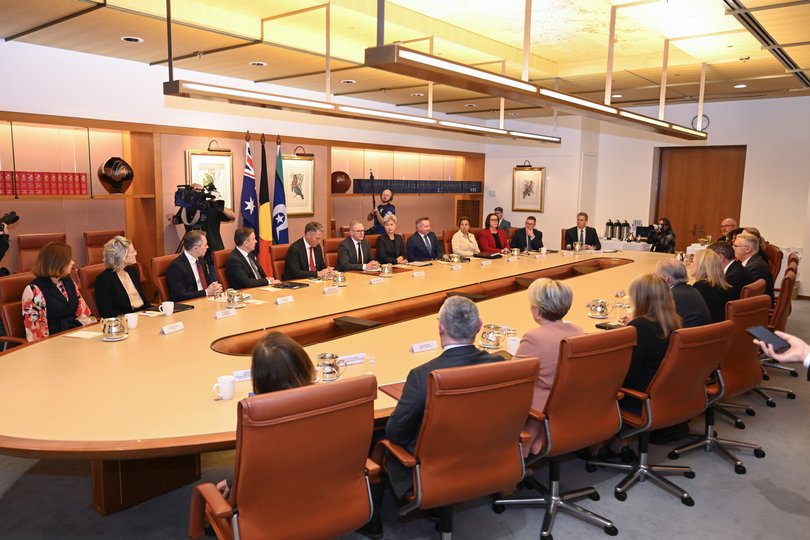AARON PATRICK: Is Jim Chalmers brave enough to be a hypocrite?

Jim Chalmers loves alliteration and political theatre. This week he took both to new heights by explaining how a gathering of policy advocates, meeting in Parliament’s hallowed cabinet room, will formulate a plan to finally fix Australia.
“Reform which is progressive and patriotic, in the PM’s words – and practical and pragmatic as well,” he told the National Press Club.
Dubbed the productivity roundtable (note the fifth P), listeners might have wondered: what is a roundtable? Is it half way between a meeting and a summit? Are you allowed to debate at a roundtable or is it only for speeches? Does it matter that the cabinet table is oval not round?
Sign up to The Nightly's newsletters.
Get the first look at the digital newspaper, curated daily stories and breaking headlines delivered to your inbox.
By continuing you agree to our Terms and Privacy Policy.In his customary style, Dr Chalmers presented the event as an important moment in the history of an energetic, ambitious government.
Business, unions and other groups will put aside their sectoral interests for benefit of the nation, unifying from August 19 to 21 under Dr Chalmers’ benign stewardship to solve problems that have frustrated government for decades.
The objectives are to “make the most of our human capital” and “unlocking innovation, investment and dynamism,” he said.
Well-known problem
As someone who has followed politics for almost 40 years, I immediately assumed the meeting would primarily be theatre. The guest list is not finalised, but the problems facing the economy are well known and thoroughly analysed.
Anyone who turns up, and you can assume the ACTU and Business Council of Australia are already on the list, will have a history of published policy positions. With 25 years having passed since the last major tax reform, the GST, there is little new to say, only different ways to say it.
The Government’s first term demonstrated a disinterest in tough decisions. From industrial relations to industry policy to welfare spending, Labor tacked left, which did nothing to alleviate what looks like a permanent budget deficit and world-leading weak productivity growth.
Political journalist Michelle Grattan, who has been around longer than me, agreed. “We don’t actually need more inquiries, or a roundtable, to come up with ideas for what could or should be done on productivity,” she wrote last week. “There have been multiple reports and thousands of recommendations.”

More optimistic
On Friday I called one policy expert to check their views. The person hopes to score an invitation to the event, and asked that I not quote them lest it bust their chances. They were far more optimistic about Dr Chalmers and Anthony Albanese’s willingness to implement difficult decisions, even if they hurt some people.
That’s for two reasons: the Prime Minister leads one of the politically strongest governments in modern history, and severe problems lie behind Australia’s superficially rosy economy.
As researchers at Sydney’s Centre for Independent Studies pointed out this week, Australia’s low unemployment, elevated inflation, strong trade performance and plentiful tax receipts means the budget should not be in deficit at all.
Instead, a surplus is not forecast for another ten years, and even that is based on heroic assumptions. They include no new expensive initiatives, which is absurd given everyone knows politicians love spending other people’s money, Labor and Liberal.
Adding to the problem, workers became 1 per cent less efficient in the year which ended March 31, according to a Productivity Commission report published Thursday. More profitable workers earn more and pay more taxes, which is why higher productivity is a much more appealing solution to the budget deficit than raising taxes.
Be a hypocrite
The spirits of another expert, economist Chris Richardson, were buoyed by Dr Chalmers’ promises of economic reform too. Mr Richardson called on the Treasurer to take a brave step and accept being called a hypocrite for breaking election promises.
“In our age of small-target elections, I prefer politicians who have the courage to be hypocrites,” he wrote. “They recognise that more needs to be done, and they’re willing to challenge the electorate to do things – even if those things weren’t discussed in our recent election campaign.”
I’m sceptical the Government will pull back, for structural and political reasons. There has a been a big expansion in government spending over the past five years, and the arms build up underway around the world, especially in the Asia-Pacific, will intensify the trend.
Naturally inclined towards a bigger state, Mr Albanese has capitalised on voters’ desire for more childcare, higher education and health services. He has been ably supported by Dr Chalmers, who has used his disciplined communications skills to present an interventionist Labor Government as a reformist one.
Raising taxes
Dr Chalmers may have another plan for August’s productivity meeting. If he really wants to repair the budget, the treasurer might use the meeting to generate support for tax increases. By making it look like they originate with independent experts, business and labour representatives, he could shrug off criticism from the Coalition, which voted against personal tax cuts in the last budget.
Better options would be to cut back middle-class welfare, including large subsidies for university students, doctors, and childcare operators.
No one gets as far Dr Chalmers without ambition, and it defies common sense to assume he does not wish to succeed Mr Albanese. The Treasurer has never shown a willingness to seriously risk his popularity for the sake of better policy.
Hopefully I’m wrong and he’ll start now.

